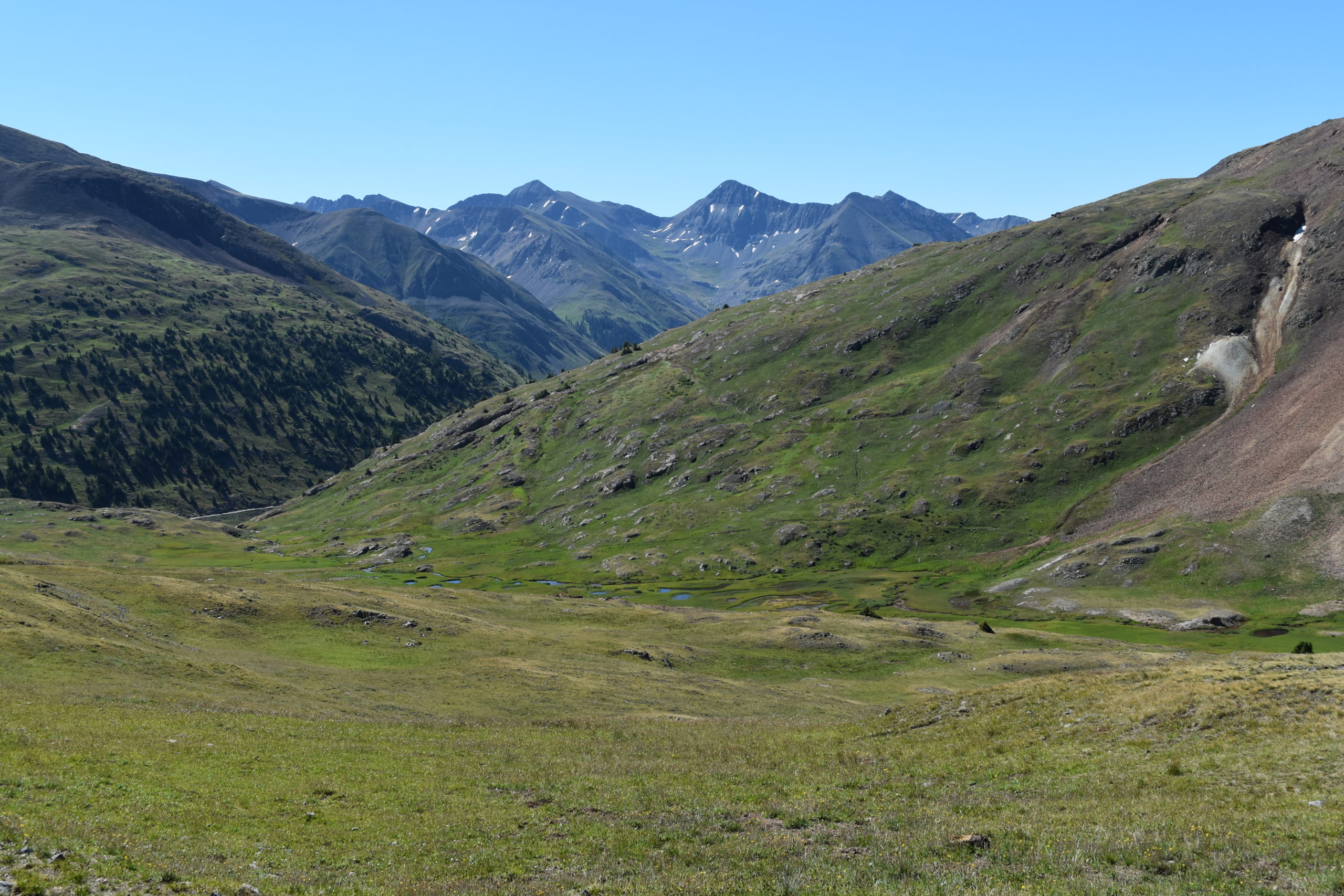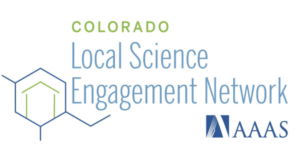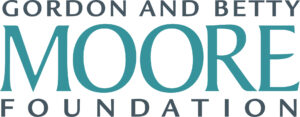Apply now to join our next cohort of Community Science Fellows and Community Leads!

Located in Southwest Colorado, Durango can be described as “where the desert meets the mountains.” Durango and regional communities face intersecting concerns around public and environmental health, climate change impacts, and gentrification and development. Public and environmental health organizations in Durango created an equitable, values-focused space for connection and collaboration to understand and respond to environmental health issues, such as water contamination, fire, decreasing snowpack and the COVID-19 pandemic that affect the economy and well-being of communities.
Forums Were Hosted Collaboratively by SJBPH, the American Geophysical Union’s Thriving Earth Exchange, and the Department of Environment and Sustainability at Fort Lewis College
(Originally posted on the SJBPH website March 9, 2022)
In the fall and winter of 2021 and 2022, San Juan Basin Public Health (SJBPH) co-hosted Well-Being Amid Disruption Forums in collaboration with the American Geophysical Union’s (AGU) Thriving Earth Exchange, the Department of Environment and Sustainability at Fort Lewis College (FLC), and the Colorado Local Science Engagement Network (a collaboration of the American Association for the Advancement of Science and Cooperative Institute of Research in Environmental Sciences at the University of Colorado Boulder). In the face of challenges presented by the COVID-19 pandemic and other environmental and public health crises, the community forums generated discussion on adaptive strategies to prepare for future impacts and build resilience in our communities.
Five forums among two cohorts were held following COVID-safe protocols between October, 2021 and January, 2022. Approximately 50 community members participated in the forums representing a diverse cross-section of local government partners, non-profits, higher education, public health, and other stakeholders. The main themes that emerged from the forums centered around four topics: “Building Connection and Communication,” “Equitable Living Related to Housing, Food, and Resources,” “Interconnected Health and Well-Being of People and the Planet,” and “Reconciling Political Divides.” The forums were facilitated by Sandhya Tillotson with Sagebrush Ltd. A short video was produced by local videographer Alex Wilson summarizing the forums, linked here.
One of the more concerning trends identified through the forums is that climate change is impacting mental health and leading to increased prevalence of what people have termed “climate anxiety,” with predictions that these impacts will continue to harm youth more than other demographics. As our society experiences more extreme weather events, indicators point to an increase in negative impacts on environmental health, health equity, and peoples well-being.
While rural communities like the ones in Southwest Colorado have less power to impact global climate change trends, forums and community conversations like “Well-Being Amid Disruption” can empower individuals to think creatively about possible solutions and talk openly about the anxiety they feel, which can help reduce feelings of helplessness. Despite the onslaught of concerning scientific findings and the predilection of media organizations to catastrophize natural disasters, rural communities are in control of maintaining and building resilience and devising strategies so that emerging environmental and public health crises are less devastating to people’s well-being.
Coupled with climate change impacts on mental health, we also know that COVID-19 has had an outsized impact on deaths of despair and loneliness. COVID-19 has exacerbated a loneliness epidemic with a particularly acute impact on young Americans. Deaths of despair are on the rise in the U.S. in ways that are not seen in other nations, as drug overdose deaths surpassed the 100,000 threshold in the period from April 2020 to April 2021, and indeed the outsized impact this has on working class Americans is concerning.
The forums highlighted that during times of public and environmental health crises, coupled with social and political turmoil, it is crucial to build connections and collaboratively devise strategies to build community health resilience and maintain economic stability. These relationships and the ability to have discussions across differences are what will propel our region towards more positive outcomes.
“There are numerous and well documented challenges our community is facing as a result of COVID-19 and other recent public and environmental health crises. What’s clear to us, is that COVID-19 laid to bare systemic health inequities nationwide, and that our mission going forward will be building resilience among our population and continuing to deliver services that help people achieve their best potential of health,” said Liane Jollon, Executive Director, SJBPH.
“How we use and communicate science during crises can either magnify our helplessness and take away our power, or motivate us – so we can manifest our power, build community and act to transform crisis to security, and a better world. Science can connect us to one another and to the Earth,” said Heidi Steltzer, Professor of Environment & Sustainability, Fort Lewis College.
“Gathering input from the community is essential to not only uncovering challenges impacting people’s lives, but also in shaping solutions and creating community-driven change,” said Sarah Brummett, Director, Office of Suicide Prevention, Colorado Department of Public Health and Environment.
There are several directions that these forums may lead the community. Partners identified the following next steps:
To learn more about San Juan Basin Public Health’s environmental health, health promotion, and prevention health programs, visit the SJBPH website.
Embedded video not loading? Click here.
Durango, Colorado sits at the midline of the northern border of the San Juan Basin, a 7,500-square mile area known for its dramatic natural beauty—an ecotone where the desert meets the mountains. It’s also known for its massive resource extraction operations, with 300 oil fields and 40,000 drilled wells, as well as the largest coalbed methane field in the world, ranking second in total gas reserves. A conversation—any conversation—about the basin’s future must be about environmental and economic factors. Where those factors intersect is in the nebulous territory of “wellbeing.” Is it synonymous with health, or is health merely one dimension? Where do environmental interests end and economic interests begin?
Community Fellow and Durango resident Heidi Steltzer and Adrian Uzunian, Director of Public Health Innovation at San Juan Basin Public Health, are working together to create a series of forums or conversations among diverse stakeholders.
These will include community members who work in local industries (such as ranchers, trail guides and oil industry employees), local NGOs and government officials, and business owners. Participants will have the opportunity to have facilitated discussions with one another about Colorado’s health and environmental priorities, with a focus on snow and water resources. Scientists from the Colorado Local Science Engagement Network will also be present to listen, answer questions, build relationships with community members, and take what they learn to meetings with Colorado policymakers planned for the spring of 2022.
As Steltzer puts it, Durango has, “an incredible wealth of expertise” from those who hunt, farm and recreate on the landscape, but less access to credentialed expertise in hydrology, drought vulnerability, and other concerns pertaining to water resources and the environment. Part of the goal is to bring these two forms of expertise together in an appropriate way, and determine how the communities priorities for economy and well-being can be supported by environmental science insights about snow and water resources. Is there a path forward from where we are towards a values-focused environmental council in which citizens contribute regional environmental and cultural knowledge to decision-makers.
The overarching goal is to create space for community conversations and values-focused planning before environmental and public health crises happen (instead of having to build a plan amidst the crisis), facilitating equitable outcomes for the entire community that also benefit the environment.
The project team is also planning a survey in partnership with the Climate Cost Project for forum participants, to gather information and understanding about climate impacts in the region.
Bordering the tribal lands of the Ute Mountain Ute Tribe, Southern Ute Tribe and Navajo Nation, Durango is a well-known city in the Southwestern United States. It resides among diverse ecosystems and culturally significant natural areas, including the Ancient Pueblo ancestral sites at Mesa Verde National Park, San Juan National Forest, and the Animas River.
The community has faced several environmental and public health challenges in recent years:
Tourism grew during the pandemic as Durango became a popular destination for socially distant outdoor activities like hiking and camping. This has consequently accelerated gentrification in Durango and surrounding communities. Oil and gas and other extractive industries have been a predominant industry since settlers came to the region, with historic and ongoing environmental impacts. Reconciling the past and preparing for well-being necessitates equitable opportunities to share the diverse perspectives within the region about economy, environment and well-being.
Heidi Steltzer
Dr. Heidi Steltzer lives in Durango, Colorado and is a dedicated environmental scientist, science storyteller, and mountain and Arctic expert. She has conducted field studies in remote regions of Colorado, Alaska and Greenland to understand how mountain ecosystems are unique and valued regions of our world. She is a lead author on High Mountain Areas in a recent Intergovernmental Panel on Climate Change (IPCC) report.
Adrian Uzunian
Adrian is the Director of Public Health Innovation at San Juan Basin Public Health, managing and participating in local projects that address behavioral health. Adrian values the power of rural communities to strengthen society and has worked on several projects throughout his career that have a focus on sustainability, including promoting local food, reforestation efforts, and helping to start a greenhouse operation.
Colorado Local Science Engagement Network

The Colorado Local Science Engagement Network (CO-LSEN) is a collaboration between the Cooperative Institute of Research in Environmental Sciences (CIRES) at the University of Colorado Boulder and the American Association for the Advancement of Science (AAAS).
CO-LSEN aims to empower scientists to speak on behalf of science-based solutions with local policymakers and create a space for policymakers to engage with the science community.
CO-LSEN aims to bring relevant and timely science to bear on policy decisions at the local and state levels so that policies are better suited to address challenges related to climate change, sustainability, technology adoption, and natural resource management in Colorado. It also intends to build and foster a new contingent of scientists in Colorado who are strongly engaged in identifying opportunities and relationships for bringing science into the policy realm.
This project is supported by funding from the Gordon and Betty Moore Foundation.

(c) 2024 Thriving Earth Exchange